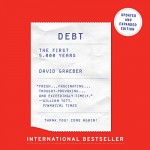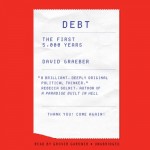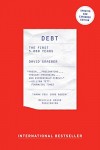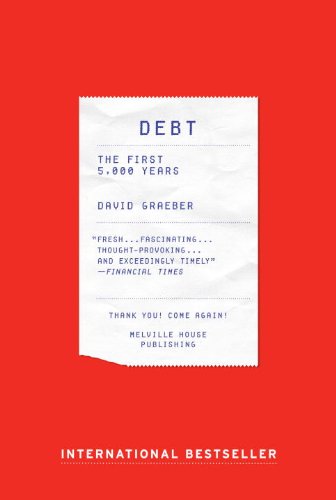[5000] Videos
Now in audio, the updated and expanded edition: David Graeber’s “fresh…fascinating…thought-provoking…and exceedingly timely” (Financial Times) history of debt.
Here, anthropologist David Graeber presents a stunning reversal of conventional wisdom: He shows that before there was money, there was debt. For more than 5,000 years, since the beginnings of the first agrarian empires, humans have used elaborate credit systems to buy and sell goods – that is, long before the invention of coins or cash. It is in this era, Graeber argues, that we also first encounter a society divided into debtors and creditors.
Graeber shows that arguments about debt and debt forgiveness have been at the center of political debates from Italy to China, as well as sparking innumerable insurrections. He also brilliantly demonstrates that the language of the ancient works of law and religion (words like “guilt”, “sin”, and “redemption”) derive in large part from ancient debates about debt, and shape even our most basic ideas of right and wrong. We are still fighting these battles today without knowing it.
[Read by Grover Gardner]
David Graeber’s ”fresh . . . fascinating . . . . thought-provoking . . . and exceedingly timely” — (Financial Times) history of debt.
Anthropologist David Graeber presents a stunning reversal of conventional wisdom: before there was money, there was debt. For more than five thousand years, since the beginnings of the first agrarian empires, humans have used elaborate credit systems to buy and sell goods — that is, long before the invention of coins or cash. It is in this era, Graeber argues, that we also first encounter a society divided into debtors and creditors.
Graeber shows that arguments about debt and debt forgiveness have been at the center of political debates from Italy to China, as well as sparking innumerable insurrections. He also brilliantly demonstrates that the language of the ancient works of law and religion — words like ”guilt,’ ”sin,” and ”redemption” — derive in large part from ancient debates about debt and shape even our most basic ideas of right and wrong. We are still fighting these battles today without knowing it.
Debt: The First 5,000 Years is a fascinating chronicle of this little known history — as well as how it has defined human history and what it means for the credit crisis of the present day and the future of our economy.
Now in paperback, the updated and expanded edition : David Graeber’s “fresh .?.?. fascinating .?.?. thought-provoking .?.?. and exceedingly timely” (Financial Times) history of debt
Here anthropologist David Graeber presents a stunning reversal of conventional wisdom: he shows that before there was money, there was debt. For more than 5,000 years, since the beginnings of the first agrarian empires, humans have used elaborate credit systems to buy and sell goods—that is, long before the invention of coins or cash. It is in this era, Graeber argues, that we also first encounter a society divided into debtors and creditors.
Graeber shows that arguments about debt and debt forgiveness have been at the center of political debates from Italy to China, as well as sparking innumerable insurrections. He also brilliantly demonstrates that the language of the ancient works of law and religion (words like “guilt,” “sin,” and “redemption”) derive in large part from ancient debates about debt, and shape even our most basic ideas of right and wrong. We are still fighting these battles today without knowing it.
Debt The First 5000 Years is your aide to rapid comprehension of the essential business principles delineated in David Graeber’s acclaimed book Debt The First 5000 Years. The concept of debt is strangely powerful, and it is consumer debt that keeps our economy moving. At the center of international politics is the subject of debt. David Graeber, undertakes in Debt The First 5000 Years, the task to delve into the many misconceptions surrounding debt and Graeber uses the last five thousand years of history to argue, discuss, and demonstrate rights and freedoms, relating how all of this history has given present day a unique set of challenges. Use this helpful paper to understand the essence of Debt The First 5000, including: A concise synopsis summarizing the history of debt and it’s definition In-depth analysis of the most useful concepts from Debt The First 5000 Years, such as the “Credit Versus Bullion, And the Cycles of History” and “The Myth of Barter”. As with all books in the Pivotal Point Papers Series, this book is intended to be purchased alongside the reviewed title, Debt The First 5000 Years.
Before there was money, there was debt
Every economics textbook says the same thing: Money was invented to replace onerous and complicated barter systems—to relieve ancient people from having to haul their goods to market. The problem with this version of history? There’s not a shred of evidence to support it.
Here anthropologist David Graeber presents a stunning reversal of conventional wisdom. He shows that for more than 5,000 years, since the beginnings of the first agrarian empires, humans have used elaborate credit systems to buy and sell goods—that is, long before the invention of coins or cash. It is in this era, Graeber argues, that we also first encounter a society divided into debtors and creditors.
Graeber shows that arguments about debt and debt forgiveness have been at the center of political debates from Italy to China, as well as sparking innumerable insurrections. He also brilliantly demonstrates that the language of the ancient works of law and religion (words like “guilt,” “sin,” and “redemption”) derive in large part from ancient debates about debt, and shape even our most basic ideas of right and wrong. We are still fighting these battles today without knowing it.
Debt: The First 5,000 Years is a fascinating chronicle of this little known history—as well as how it has defined human history, and what it means for the credit crisis of the present day and the future of our economy.
Product Features
- Used Book in Good Condition
Now in paperback: David Graeber’s “fresh .?.?. fascinating .?.?. thought-provoking .?.?. and exceedingly timely” (Financial Times) history of debt
Here anthropologist David Graeber presents a stunning reversal of conventional wisdom: he shows that before there was money, there was debt. For more than 5,000 years, since the beginnings of the first agrarian empires, humans have used elaborate credit systems to buy and sell goods—that is, long before the invention of coins or cash. It is in this era, Graeber argues, that we also first encounter a society divided into debtors and creditors.
Graeber shows that arguments about debt and debt forgiveness have been at the center of political debates from Italy to China, as well as sparking innumerable insurrections. He also brilliantly demonstrates that the language of the ancient works of law and religion (words like “guilt,” “sin,” and “redemption”) derive in large part from ancient debates about debt, and shape even our most basic ideas of right and wrong. We are still fighting these battles today without knowing it.






